上海牛津七年级上Unit知识点
- 格式:docx
- 大小:79.18 KB
- 文档页数:8
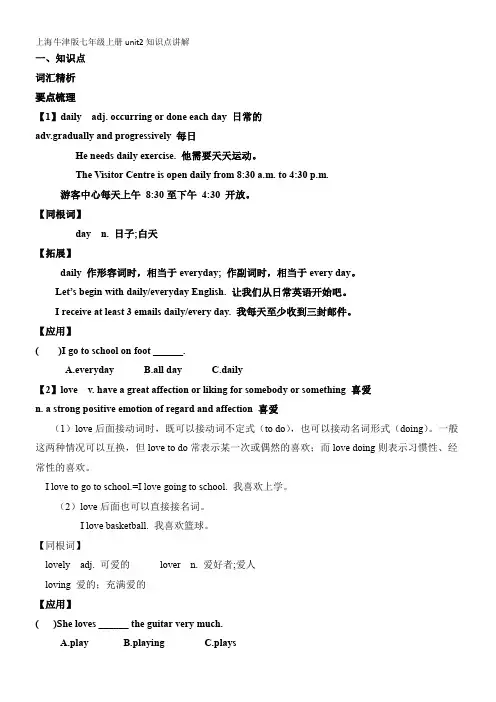
上海牛津版七年级上册unit2知识点讲解一、知识点词汇精析要点梳理【1】daily adj. occurring or done each day 日常的adv.gradually and progressively 每日He needs daily exercise. 他需要天天运动。
The Visitor Centre is open daily from 8:30 a.m. to 4:30 p.m.游客中心每天上午8:30至下午4:30 开放。
【同根词】day n. 日子;白天【拓展】daily 作形容词时,相当于everyday; 作副词时,相当于every day。
Let’s begin with daily/everyday English. 让我们从日常英语开始吧。
I receive at least 3 emails daily/every day. 我每天至少收到三封邮件。
【应用】( )I go to school on foot ______.A.everydayB.all dayC.daily【2】love v. have a great affection or liking for somebody or something 喜爱n. a strong positive emotion of regard and affection 喜爱(1)love后面接动词时,既可以接动词不定式(to do),也可以接动名词形式(doing)。
一般这两种情况可以互换,但love to do常表示某一次或偶然的喜欢;而love doing则表示习惯性、经常性的喜欢。
I love to go to school.=I love going to school. 我喜欢上学。
(2)love后面也可以直接接名词。
I love basketball. 我喜欢篮球。
【同根词】lovely adj. 可爱的lover n. 爱好者;爱人loving 爱的;充满爱的【应用】( )She loves ______ the guitar very much.A.playB.playingC.plays【3】seldom adv. not often 很少;不常I seldom go to the cinema. 我很少去看电影。
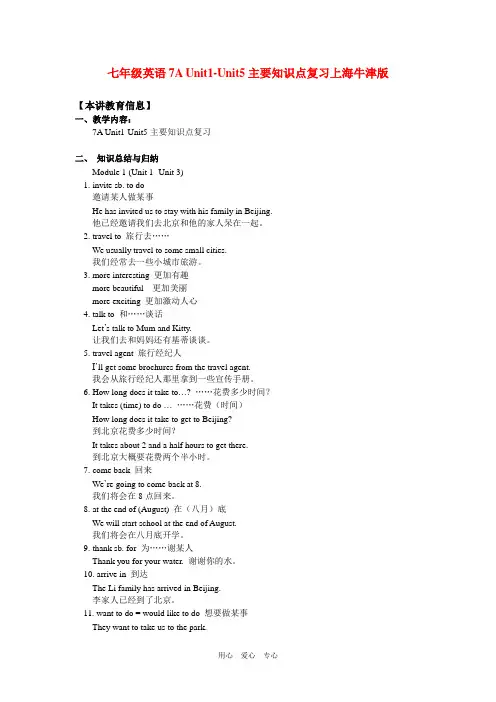
七年级英语7A Unit1-Unit5主要知识点复习上海牛津版【本讲教育信息】一、教学内容:7A Unit1-Unit5主要知识点复习二、知识总结与归纳Module 1 (Unit 1- Unit 3)1. invite sb. to do邀请某人做某事He has invited us to stay with his family in Beijing.他已经邀请我们去北京和他的家人呆在一起。
2. travel to 旅行去……We usually travel to some small cities.我们经常去一些小城市旅游。
3. more interesting 更加有趣more beautiful 更加美丽more exciting 更加激动人心4. talk to 和……谈话Let’s talk to Mum and Kitty.让我们去和妈妈还有基蒂谈谈。
5. travel agent 旅行经纪人I’ll get some brochures from the travel agent.我会从旅行经纪人那里拿到一些宣传手册。
6. How long does it take to…? ……花费多少时间?It takes (time) to do ………花费(时间)How long does it take to get to Beijing?到北京花费多少时间?It takes about 2 and a half hours to get there.到北京大概要花费两个半小时。
7. come back 回来We’re going to come back at 8.我们将会在8点回来。
8. at the end of (August) 在(八月)底We will start school at the end of August.我们将会在八月底开学。
9. thank sb. for 为……谢某人Thank you for your water. 谢谢你的水。
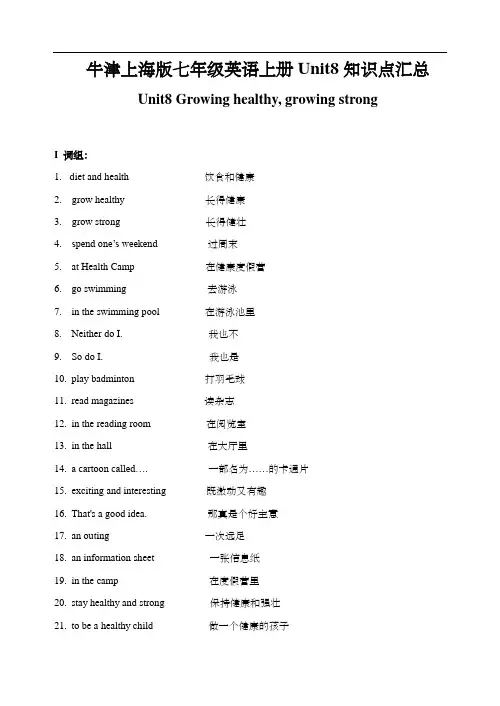
牛津上海版七年级英语上册Unit8知识点汇总Unit8 Growing healthy, growing strongI 词组:1.diet and health 饮食和健康2. grow healthy 长得健康3. grow strong 长得健壮4. spend one’s weekend 过周末5.at Health Camp 在健康度假营6.go swimming 去游泳7.in the swimming pool 在游泳池里8.Neither do I. 我也不9.So do I. 我也是10.play badminton 打羽毛球11.read magazines 读杂志12.in the reading room 在阅览室13.in the hall 在大厅里14.a cartoon called…. 一部名为……的卡通片15.exciting and interesting 既激动又有趣16.That's a good idea. 那真是个好主意17.an outing 一次远足18.an information sheet 一张信息纸19.in the camp 在度假营里20.stay healthy and strong 保持健康和强壮21.to be a healthy child 做一个健康的孩子22.go to bed early 早睡23.get up early 早起24.exercise regularly 定期锻炼25.at least 至少26.eight glasses of water 八杯水27.too much sweet food 太多的甜食28.too many soft drinks 太多的软饮料29.good/ bad habits 好/坏习惯30.have a sore throat 喉咙痛31.have toothache 牙痛32.have a stomach ache 胃痛st Sunday 上周日34.three packets of crisps 三包薯片35.two boxes of ice cream 两盒冰淇凌36.some vegetables 一些蔬菜37.four bars of chocolate 四块巧克力38.three bottles of lemonade 三杯柠檬汁39.a lot of fried food 许多油炸食品40.enough fruit 足够的水果41.watch less TV 少看电视42.eat fewer crisps 少吃薯片43.eat more fruit 多吃水果44.change my bad habits 改变我的坏习惯ed to do sth. 过去常常做某事46.not… any longer. 不再47.do a lot of exercise regularly 有规律地做许多的运动48.study hard 努力学习49.in the past 在过去II. 词性转换:1. health n. 健康healthy a. 健康的unhealthy a. 不健康的2. call v. 叫喊;呼唤;打电话called a. 被叫做……的,名为……的3. regularly adv. 有规律地;正常地regular adj. 有规律的;正常的irregularly adv. 无规律地;不正常地irregular adj. 无规律的;不正常的4. many/much adj./ pron. 许多的/许多more adj./ pron. 更多的/更多5. few adj. 少数的;几乎没有的fewer adj. 较少的pron. 少数;几乎没有pron. 较少6. little adj. 少的less adj.较少的adv.少adv.较少地n. 没有多少n. 更少的数7. change v. 变化,交换change n. 变化;零钱changeable adj. 易变的,不定的8. suggestion n. 建议suggest v. 建议9 exciting adj.令人激动的excited 感到激动的10 interesting interestedInteresting places= places of interest be interested inIII. 语言点/句型:1.Mr Hu and the students are spending their weekend at Health Camp. 胡老师和学生在健康营度周末。
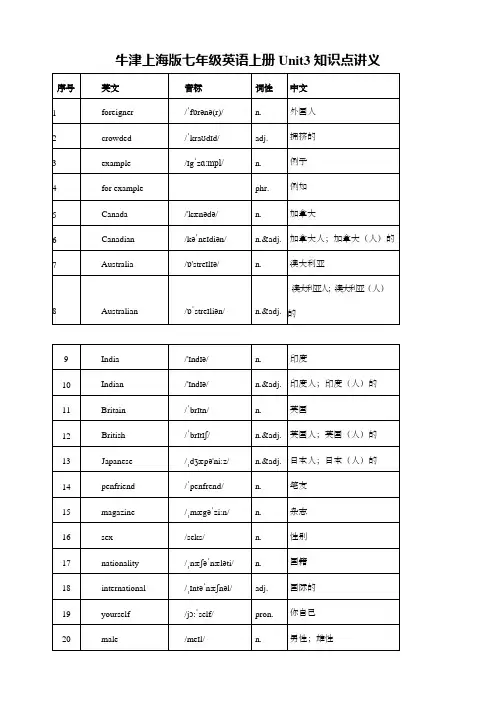
牛津上海版七年级英语上册Unit3知识点讲义知识点梳理eful words and expressions1. Garden City is a crowded city.➢be crowded with=be full of2. Over six million people live in Garden City.➢over =more than➢当表示确切的数目时,hundred, thousand, million等数词前用单数形式。
当表达不具体的数目,如成百上千,成千上万等时,hundrend, thousand等数词用复数形式,且在其后加介词of。
[e.g.] Hundred of visitors came to Shanghai every year.3. For example, there are more than twenty-eight thousand people from Canada in Garden city.➢for example一般只举同类人或物中的“一个”为例,作插入语,用逗号隔开,可置于句首、句中、句末。
[e.g.] Noise,for example,is a kind of pollution.4. —What do we call people from Canada?— We call them Canadians.➢call意为“把…称作”➢注意国家和国籍的不同表达:[e.g.] He is a boy from Canada. = The boy comes from Canada. = The boy is Canadian.➢本课已出现的及常见的国名、国籍和国名列表如下:5. Nowadays we can visit countries near or far away from China.➢near作形容词,表示1)"邻近的,接近的"。
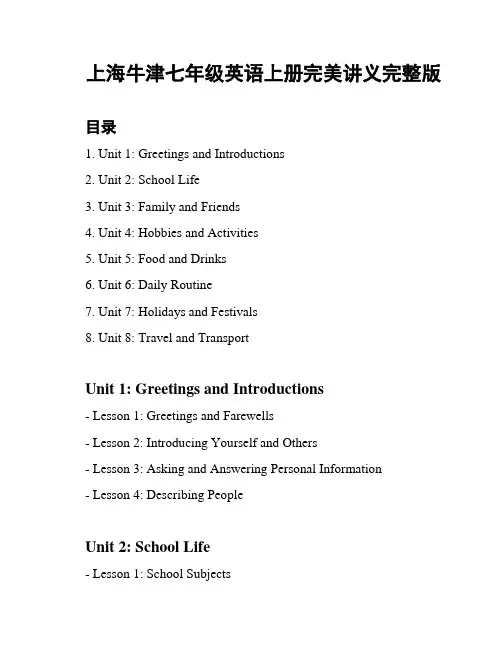
上海牛津七年级英语上册完美讲义完整版目录1. Unit 1: Greetings and Introductions2. Unit 2: School Life3. Unit 3: Family and Friends4. Unit 4: Hobbies and Activities5. Unit 5: Food and Drinks6. Unit 6: Daily Routine7. Unit 7: Holidays and Festivals8. Unit 8: Travel and TransportUnit 1: Greetings and Introductions- Lesson 1: Greetings and Farewells- Lesson 2: Introducing Yourself and Others- Lesson 3: Asking and Answering Personal Information- Lesson 4: Describing PeopleUnit 2: School Life- Lesson 1: School Subjects- Lesson 2: Classroom Objects- Lesson 3: School Facilities- Lesson 4: Talking about TimetablesUnit 3: Family and Friends- Lesson 1: Talking about Family Members - Lesson 2: Describing People's Appearance - Lesson 3: Discussing Family Activities- Lesson 4: Talking about FriendsUnit 4: Hobbies and Activities- Lesson 1: Talking about Hobbies- Lesson 2: Sports and Activities- Lesson 3: Inviting and Accepting Invitations - Lesson 4: Talking about PlansUnit 5: Food and Drinks- Lesson 1: Food and Drinks Vocabulary- Lesson 2: Ordering Food in a Restaurant- Lesson 3: Talking about Preferences- Lesson 4: Describing FoodUnit 6: Daily Routine- Lesson 1: Talking about Daily Activities- Lesson 2: Telling the Time- Lesson 3: Daily Routines and Schedules- Lesson 4: Talking about Habits and FrequencyUnit 7: Holidays and Festivals- Lesson 1: Talking about Holidays and Festivals- Lesson 2: Celebrations and Traditions- Lesson 3: Discussing Special Occasions- Lesson 4: Talking about Future PlansUnit 8: Travel and Transport- Lesson 1: Modes of Transport- Lesson 2: Giving Directions- Lesson 3: Asking for and Giving Travel Information - Lesson 4: Talking about Past Travel Experiences以上是《上海牛津七年级英语上册》的完美讲义完整版。
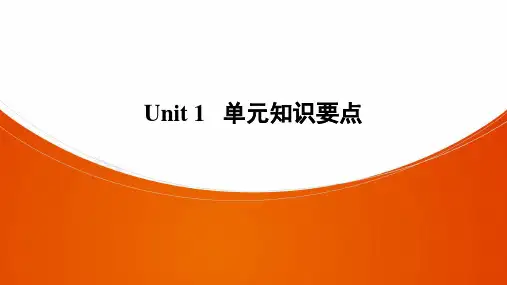

牛津英语七年级上期各单元知识点归纳Chapter One Making friends一, 重点短语work as 从事……工作hear from sb. 收到(某人的)来信reply to sb. 回复(某人) write to sb. 写信给某人walk to school 步行去学校enjoy doing sth. 喜欢做某事would like to do 愿意/想做某事be keen on 对……着迷, 热衷于less than 少于favourite sport 最喜欢的运动a boy called Simon 一个名叫西蒙的男孩pay attention to 注意到(注意to是介词)at the top-right corner 在右上角look up 查找Form One (英国)中学一年级not at all 一点也不二, 解释句子would like to = want to reply to = answercome from = be from work as = be (am / is / are)walk home = go home on foot enjoy doing sth. = like doing sth.borrow sth. from sb.= lend sth. to sb. walk my dog = take my dog for a walk enjoy oneself = have a good time / have fun take a bus to school = go to school by bus own = have / has = belong to (记得要把原句的主语和宾语位置颠倒)be keen on = be very interested in = like… very muchhear from sb.= get / receive a letter from sb. = get / receive one’s letter三, 语法知识1) 带特殊疑问词的特殊疑问句(what / where / when / how / who (whom) / whose / which /why / how old / how many / how much / how long / how often / how soon / how far) 要注意: 对时间提问的几个疑问词when, how long和how soon的区别;对数量提问的how many和how much的区别(另外how much还可以问价格);2) 不定冠词(a / an) 和定冠词the的用法(首次提到某人或某物用不定冠词, 谈到上文已经提过的人或物用定冠词);3) 连词(and / but / so)的用法(and”和”表并列, but”但是”表转折, so”所以”表结果)。
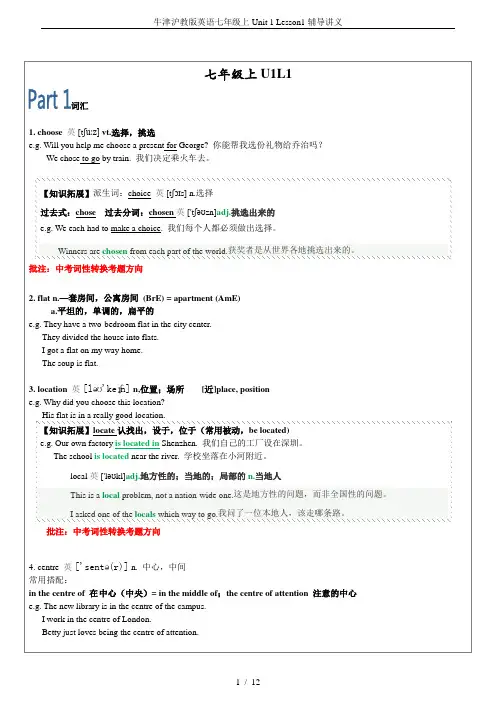
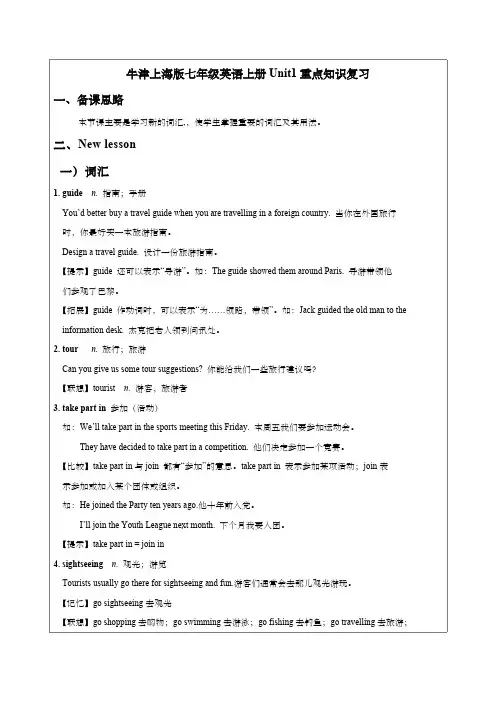
牛津上海版七年级英语上册Unit1重点知识复习一、备课思路本节课主要是学习新的词汇,,使学生掌握重要的词汇及其用法。
二、New lesson一)词汇1. guide n. 指南;手册You’d better buy a travel guide when you are travelling in a foreign country. 当你在外国旅行时,你最好买一本旅游指南。
Design a travel guide. 设计一份旅游指南。
【提示】guide 还可以表示“导游”。
如:The guide showed them around Paris. 导游带领他们参观了巴黎。
【拓展】guide 作动词时,可以表示“为……领路,带领”。
如:Jack guided the old man to the information desk. 杰克把老人领到问讯处。
2. tour n.旅行;旅游Can you give us some tour suggestions? 你能给我们一些旅行建议吗?【联想】tourist n.游客,旅游者3. take part in 参加(活动)如:We’ll take part in the sports meeting this Friday. 本周五我们要参加运动会。
They have decided to take part in a competition. 他们决定参加一个竞赛。
【比较】take part in与join 都有“参加”的意思。
take part in 表示参加某项活动;join表示参加或加入某个团体或组织。
如:He joined the Party ten years ago.他十年前入党。
I’ll join the Youth League next month. 下个月我要入团。
【提示】take part in = join in4. sightseeing n.观光;游览Tourists usually go there for sightseeing and fun.游客们通常会去那儿观光游玩。
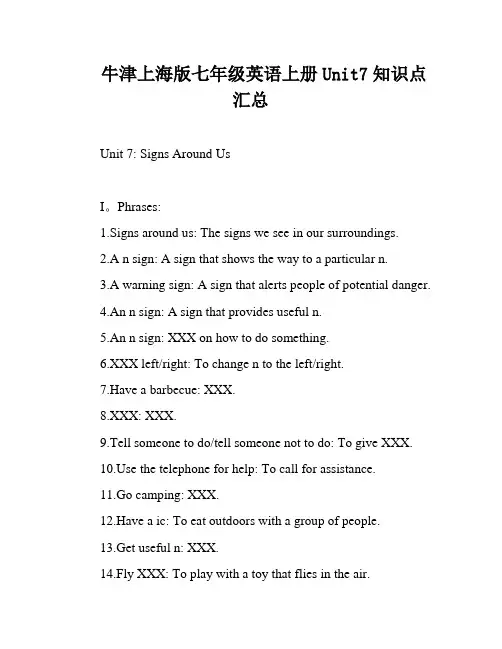
牛津上海版七年级英语上册Unit7知识点汇总Unit 7: Signs Around UsI。
Phrases:1.Signs around us: The signs we see in our surroundings.2.A n sign: A sign that shows the way to a particular n.3.A warning sign: A sign that alerts people of potential danger.4.An n sign: A sign that provides useful n.5.An n sign: XXX on how to do something.6.XXX left/right: To change n to the left/right.7.Have a barbecue: XXX.8.XXX: XXX.9.Tell someone to do/tell someone not to do: To give XXX.e the telephone for help: To call for assistance.11.Go camping: XXX.12.Have a ic: To eat outdoors with a group of people.13.Get useful n: XXX.14.Fly XXX: To play with a toy that flies in the air.15.Park our car: To leave a XXX.16.Wash these XXX: XXX.17.Pick the flowers: XXX.18.Keep quiet: XXX.19.Roll the dice: To throw a small cube with numbers on it to determine a result.20.Take turns to do something: To alternate doing something with others.nd on: XXX.22.Miss a turn: To skip a chance to do something.23.Good XXX: XXX.24.In a park: XXX.25.In the countryside: XXX.26.On a road: XXX.27.XXX: XXX.II。
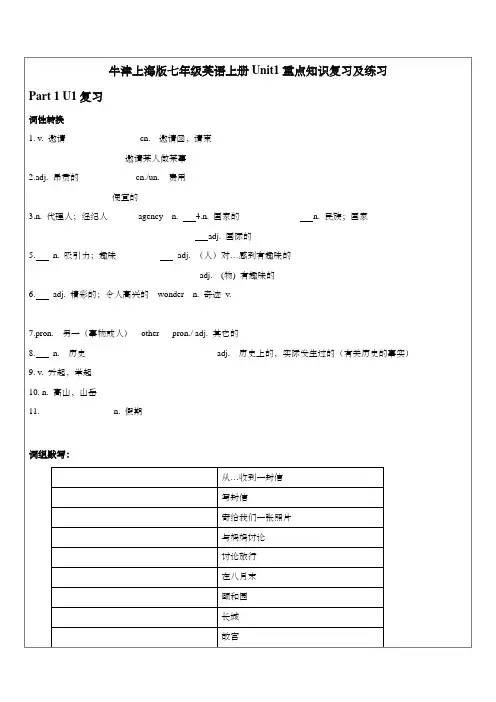
2) 形容词比较级+than the other+复数名词。
例如:Asia is bigger than the other continents on the earth.亚洲是地球上最大的洲◆形容词的常用结构:◇a + adj + n a tall boy ◇be + adj. He is tall.◇keep/find/make/think… it adj. to / that …… ◇be + as + adj. + as do + as + adv. + as1)形容词在句子中的句法作用及位置:⑴ 作定语,放在名......词的前面....,.修饰名词。
结构:a/an/ …_______ 名词 ★ 后置的情况:修饰复合不定代词时放在代词之后。
如:Something serious has happened to him .(他发生了严重的事故) 1. Every minute there is _____going on here.A. exciting somethingB. something excitingC. exciting anythingD. anything exciting 2. This river is about 5 feet ________. A. deep B. widely C. depth D. Length★ 少数形容词只能作定语这些形容词包括 little, live , elder, eldest 等,只能作定语,不能作表语。
例如:(正)My elder brother is a doctor. (误)My brother is elder than I. (正)This is a little house.(误)The house is little. (正)Do you want live fish or dead one?(误)The old monkey is still live.⑵作表语时放在连系动词之后,构成系表结构。
牛津上海版七年级上Unit1语法复习教案七年级上U1语法复习教案一、专题知识梳理1.冠词不定冠词a / ana 易错的辅音音素开头的单词a+university/uniform/useful/uselessmake a living; in a hurry; go for aswim;have a good time; have a look at;have a walk/ talk /cold ; It’s apleasure…an易错的元音音素开头的单词an+ hour /honesttake an active part in 积极参加…26个字母中有12个字母以元音音素开头,要用an: (A,E, F, H, I, L, M, N, O, R, S, X )定冠词the1、特指、独一无二、序数词前the boy in blue;the sun;the only;the first2、乐器、same、最高级前play the piano/violin/guitar/drum;the same;the thinnest;3、搭配make the bed 铺床;by the way 顺便说一下;take the place of 代替4、其他用法the + adj. 表示一类人the poor,the rich,theblindthe + 姓氏复数,表示一家人the Whites零冠词三餐、球类、棋牌类、官职have breakfast; play tennis; play chess; play cards; manager; monitorby + 交通工具by underground 乘地铁注意区别go to school 去上学(强调功用);go to the school 去学校(强调地点)go to church 去做礼拜(强调功用);go to the church去教堂(强调地点)2.介词:其他常考介词的含义介词含义for 为了,因为,对...来说to 表示方向from 从...,来自于...about 关于,大约against 反对,相反along/down 沿着besides 除了还有by 表示方式,通过(方式、交通工具等)except 除了(不包括在内)in 语言,在...里面like 像...一样through 穿过,通过towards 朝向with 与...一起,用(材料),带有,具有without 没有3.代词【课堂练习】1. How nice the weather is!___________ Sun is shining.A. AB. AnC. TheD. /2._____pilot in black jacket saw ______UFO last year.A. The, aB. The, anC. A, anD. A, a1.We are looking forward _________a film next week.A. to seeB. to seeingC. for seeingD. seeing2.You can find the cinema _________the end of the street.A. onB. inC. atD. to3.The twins opened the back door of the green van ________a knife.A. useB. onC. withD. take4.What happened _______ a windy day last week?A.at B. in C. on D.from5. This new scarf is made_________wool. It feels soft.A.in B. of C. by D. from6. Sometimes pe ople buy “take-away food” in a shop and take it ________ home, or ________ their workplace.A. to, toB. to, /C. /, toD. /, /7. Jack looked very worried. What happened ________ him?A. onB. forC. toD. in8. Mr. Chen has made a slide show ______ the children.A. toB. ofC. withD. for9. Animals can get many kinds of food the forest.A. fromB. toC. atD. for10. _______a hot summer day, Sam went to the beach and hada swim.A. InB. ByC. OnD. under代词1.—How many bottles of milk can we buy?—________.A. NoneB. No oneC. NothingD. Not any2.Some of my students used to play computer games very often. ________.A. So am IB. So do IC. So did ID. So have I3.Maggie is taller than ________ in her class.A. anyone elseB. othersC. any othersD. any other one4.There will be ______ underground trains and _______ pedicabs(三轮车)in Shanghai.A.much, lessB. more, lessC. more, fewerD. more, less5.---How many of you have been to Hong Kong before? ---________.A. NoneB. NoC. NothingD. Nobody6.We can see traffic jams on the roads at weekends than on weekdays.A. fewB. fewerC. lessD. little7. Many leaves fall in autumn, so you can see _____leaves on the tree in winter.A. littleB. lessC. fewerD. a lot8. You can park your car on ______ side of the street.A. bothB. allC. noneD. either9. There are many trees on ______ sides of Huaihai Road.A. neitherB. eitherC. bothD. all10. There are many flowers on _____ side of the square.A. neitherB. noneC. allD. every一、阅读理解【知识梳理】A篇阅读四选一题型有:细节题、词义猜测题、主旨题、推断题。
英语初一系列之Unit 1 Making friends课前回顾1.博客2.爱好3.live with4.去学校5.all over the world6.be/come fron7.接近 8.与某人交朋友9.be good at 10.想要做某事11.询问某人的职业 12.pay attention toGetting readyRead a German girl’s blog.考点聚焦:名词所有格(1)句中的girl’s 是名词所有格,表示“女孩的”,在英语中,单数名词和不以-s结尾的复数名词的所有格通常是在结尾加’s。
This is (Lily)book.—Is this your ruler?—No,it’s my(brother).(2)以s结尾的的复数名词,只在词尾加’构成所有格。
This is my (parent)car.Are these the (twin)schoolbag?(3)并列名词的所有格表示共有时,只在最后一个名词的词尾加’s;表示各自所有时,则分别在每个名词词尾加’s。
Tom and mike’s mother.Mary’s and Kate’s mothers.(4)名词所有格通常情况下表示有生命的东西,无生命的东西通常用of来表示名词之间的所属关系。
(翻译时从前往后翻译)The door of the room.(5)表示时间、距离、国家、城市等无生命的东西的名词,也可以在词尾加’s或’构成所有格.知识点1.“疑问词+ 不定式”结构We don’t know where to go tomorrow.此结构在句中做宾语。
在英语中,不定式可以和疑问词连用,构成不定式短语,在句中做主语,宾语或表语等。
知识点2.Sound 声音(1)作可数名词,意为“声音”➢She heard the of footsteps outside.她听见了外面的脚步声.【易混辨析】sound,voice与noiseThe woman is speaking in a low.这位女士正在低声说话.Don’t make . 不要制造噪音.知识拓展(2)Sound做系动词的用法Sound还可以做系动词,意为“听起来”,后常接形容词做表语Sound后还可以接介词like,构成短语sound like,意为“听起来像”,sound like后常接名词除sound外,常见的系动词还有look,smell,taste feel等。
2021学年牛津上海版英语七年级第一学期知识点整理及配套练习unit 1一、知识点整理1.*I’ve got a letter from Uncle Weiming.我收到了一封卫明叔叔的来信。
He has invited us to stay his family in August.他邀请我们八月去和他家人一起过。
(1)invite sb. to do sth.邀请某人做某事(2)现在完成时:概念:现在完成时表示动作已经发生,并对现在产生一定的影响。
标志性词语:already(已经,用于肯定句), just(刚刚一般在句子中间,have/has 的后面,用于肯定句),yet(,还, 否定句和疑问句中,一般置于句尾),never(从未)ever(曾经), sinc e+具体时间点, fo r+一段时间(用于延续性动词后,表示动作延续了一段时间)before(在这之前)(2)表达:A. 肯定形式:S (非)+ have(’ ve) done sth. / S(三)has (’s)done sthB.否定形式:S (非)+have not(haven’t) done sth. / S(三)has not (hasn’t) done sthC. 疑问形式:Have + S (非)+done sth ? / Has + S(三)+done sth ?(1)be (am/ is/ are) + going to do,是将来时的一种,表示打算或计划做某事。
标志性词语:tomorrow ... 明天…next year...下一年... in + 一段时间: 如: in a year the coming year :将要来到的一年soon不久in the future在将来表达: 肯定形式:: be going to +v 否定形式::be not going to +v疑问形式:Be +S+going to +v be: am / is /are(2)get sth. from sb. 从某人那里得到……3.It’s cheaper and more interesting. (坐火车)更便宜也更有趣。
模块课次1-22-32-3六年级上Unit Grammar考点 / 易错点1 Family and 1.How questionsrelatives 2.Wh-questions频率副词3.Adverbs of frequencyalways/usually/sometimes2 I have a good 1. adverbs of frequency and time : 1.频率和时间friend always/just already/never副词2. present perfect tense 2.现在完成时3 Spending a day 1. Wh- questions现在完成时1.out together 2. present perfect tense: 2. 一搬将来时3.How questions4. simple future tense ‘going to’4 What would you 1. modal verb: would/would not 1.情态动词like to be? 2. Wh- questions would 的用法3. connective: because 2.连词5. Open Day 1.simple future tense “will ” 1.一般将来时2.adverbs of sequence 2.副词3. simple future tense介词3.4. prepositions: at/on/in6. Going to school 1.How questions 1.连词2. connective: when不定代词2.3. a few ,some, a lot of7.Rules round us 1. modal verb: must /must not 1. 情态动词2. imperatives must 的用法2.祈使句8. The food we eat 1. Wh- questions 1.现在完成时2.present perfect tense介词的使用2.3. prepositions: at/in选择9 Picnics are fun 1. modal verbs: shall /would/may 1. 情态动词2. connective: because shall 用法2.连词的使用选择10.Healthy eating 1. a little, some, plenty of, a lot of 1.不定代词2. adjectives to make comparisons 2.形容词比较3.modal verbs: should/should not级3. 情态动词should 用法11.Let ’smake a1. noun phrases 1.名词短语pizza2. adverbs of sequence 2.副词3. prepositions:3.方位介词 below/above/on/in重点:介词:at, on, in ,情态动词: would, must, shall ,一般将来时,现在完成时,不定代词 :a few, some, a lot of六年级(下)一.共分为 11 个单元,各单元内容为:六年级下模块课次2-32-3UnitGrammar 1. Great cities in1. How questionsAsia2. preposition: by3. gerund: like/enjoy/love doing4. adverbs to show position 2. At the airport1. preposition: in, for2. present perfect tense3. Dragon Boat 2. modal verb: wouldFestival3. prepositions: with, without4. connective: but4. Staying healthy 1.Wh-questions2. How questions3. connective: because4. adverbs of degree andfrequency5. What will I be 1. adjectives to describe peoplelike?2.simple future tense3. modal verb: have to4. adverbs of sequence6. Seasonal1.modal verb: must考点 / 易错点1. 注意语序2. 表方位的副词1. 介 词: in, for2. 现在完成时 1. 情态动词 用于情景 交际 2. 介词 : with3. 连词的使用选择 1. 注意语序 2. 连词的使 用选择 3. 频率副词1. 一般将来 时2. 情态动词用 于 情 景交际3. 副词情态动词用于changes 2.many, not many3.connective: because7. Traveling in 1.pronouns to show quantitiesGarden City 2.adjectives to makecomparisons3.simple future tense8. Windy weather1.connective: when2.modal verbs: can, may, should3.adverbs of manner9. Sea water and 1.connective: ifrain water 2.preposition: by10. Forests and 1.preposition: fromland 2.adjectives to describe objects11. Controlling fire 1.modal verbs: may, must2.there be3.prepositions: outside, near,on情景交际1.形容词many和 not many 的用法2.一般将来时1.连词的使用选择2.情态动词用于情景交际1.连词的使用选择2.介词: if1.介词: from2.形容词1.情态动词用于情景交际2.There be句型:主谓一致3.介词对位置的描述重点:情态动词用于情景交际,介词:for, if, with, from,there be 句型,一般将来时七年级(上)一. 共分为 11 个单元,各单元内容为:七年级上模块课Unit Grammar考点 / 易错点次1.Relatives in 1.adjectives to make 1.比较形容词Beijing comparisons 2. 方位名词和2. nouns and adverbs to show方位副词1-22-32-3position 3. How questions2.Our animal 1.Wh-questions祈使句friends 2.How questions3. imperatives3.Friends from 1.preposition : near、far away 1.方位介词other countries from 2.现在完成时2.Wh-qquestions3.present perfect tense4.Jobs people do 1. Wh—questions 1. 注意语序2.Yes/No questions 2.一般现在时3.simple present tense 3.一般过去时4.simple past tense5.Choosing new flat 1.imperatives 1.祈使句2.prepositions of position 2.方位介词6. Different places 1.there be 1.there be 句型2.Wh- questions 2.现在进行时3.present continuous tense连词3.4.connectives:when /because7. Signs around us 1.modal verbs: can/must(not)情态动词2.Wh-qestions8.Growing healthy, 1. so⋯/neither⋯ 1.so.../ neither...growing strong 2.connective: if句型3. modal verb: used to 2.连词 if4.quantifiers to describe amounts 3 情态动词4.数量词9.International 1.Wh-questions 1.一般过去时Food Festival 2. How questions2.祈使句3. simple past tense4. imperatives1o.A birthday party 1.simple future tense”going to” 1.一般将来时2. adverbs of sequence 2.副词3. modal verb: would like 3.情态动词1.Wh-questions疑问句型11.My food project 2. How questions重点:祈使句,方位介词,副词,现在完成时, so/neither句型七年级(下)一.共分为 11 个单元,各单元内容为:七年级下模块课次2-31-21-2Unit1.Writinga travel guide2.Going to see afilm3.A visit to GardenCity4.Let’s go shopping5.What can welearn from others?6.Hard work for abetter life7.In the future8.A more enjoyableschool life9.The windis blowing10.Water Festival11.ElectricityGrammar考点 / 易错点1. Wh-questions 1.情态动词用2.modal verb: can于情景交际3.connective: if 2.if 连词的使用1.prepositions:into,along 1.介词2.so.../neither... 2.so.../ neither...句型1. prepositions: for,since 1.介词的使用2.present perfect tense 2.现在完成时1.prepositional phrases and 1.介词短语、描adjectives to describe objects述形容词2.simple present tense 2.一般现在时Connective: although1.连词的使用1.adjectives to describeevents 1.描述形容词2.start doing1.simple future tense“will ”1.一般将来时2.agreement and disagreement 2. 个人观点,赞同与否1.modal verb: would 1.情态动词2.reflexive pronouns to identify 2.反身代词的people使用1.adjectives to make comparisons 1. 描述、比较and describes people形容词2. adverbs of sequence 2. 副词3.pronouns to identify possessions 3. 物主代词的使用1.connective: when1.连词2.imperatives2.祈使句3.prepositions: near,at3.方位介词1.Wh-questions注意陈述语序2. How questions重点:介词的使用,代词:物主代词,反身代词,形容词,现在完成时八年级(上)一.共分为 7 个单元,各单元内容为:八年级上模块课Unit Grammar次1.Penfriends 1.Asking Wh-question2.Asking How-questioning a and an2.Work and play 1.The simple past tense2 2.Adverbs and adverbial phrasesof frequency3. Trouble 1.The simple past tense2.Adverbial phrases for the past4.Numbers1.Cardinal and ordinal numbers2.Decimals and fractions3.Instructions and statementsabout number易考1.Wh- 句型2.How - 句型3.a/an 的使用1.一般过去时2.表示频率的形容词和副词1.一般过去时2.过去分词作状语1.基数词和序数词2.分数和小数3.关于数字使用的说明1-25.Encyclopaedias 1.Countable and uncountablenounsing another and (the) other 6.No body wins 11.T he simpl efuture tense1-2 2. Adverbs and adverbial phasesfor future1.可数名词和不可数名词2.another/other/ theother 的运用1.一般将来时2.表示将来的副词和副词短语7. Nobody wins 21.Preposition of location 1.表示方位ing some and any的词ing somebody/someone/sh 2.some/any的使用3.Somebody/someone/something重点:一般过去时,可数不可数名词,基数词,序数词,过去分词作状语八年级(下)一.共分为 7 个单元,各单元内容为:模块课次222八年级下Unit Grammar易考1.Tress The present continuous tense.现在进行时2.Water Talking about amounts对于 a lot of/afew/a little/notmany/none/much 的考查3. Electricity 1.modal verbs 1.情态动词2.can must may tell/hope/notice3.object clauses/agree的用法4.Newspaper 1.modal verbs 1. should/ought2.should,ought to to句型3.objects clauses 2.宾语从句5.Magazine ing pronouns 1.名词的运用article 2.Adverbial clauses状语从句6.Travel Using conjunctions: and, but,so 1.连词andbut so 的使用the /a /an 的使用7.Poems ing who and whose 1.who/whoesing mine yours,his hers ours的用法theirs 2. mine/hie/hering one and ones s/ours/theirs 等物主代词的用法3. one/ones 的用法重点:连词and but so 的使用,状语从句,宾语从句,should/ought to 句型,情态动词的用法,现在进行时九年级(上)一.共分为 7 个单元,各单元内容为:九年级上模块课Unit Grammar易考次1:Ancient Greece The present perfect tense现在完成时(句型转换易2-3考)2. Traditional Passive voice被动语态(句skills型转换易考)3.Pets 1.Passive voiceing adverbsputer parison of adjectives形容词和副词parison of adverbs的比较级(特殊形式的二级易考)2-3 5.The human Using infinitives不定式的用法brain(用 it 做形式主语的句式6.Detectives Using infinitives易考7.Escaping from Using adjectives形容词的使用kidnappers重点:不定式的用法,形容词副词的比较级,现在完成时九年级(下)---- -----一.共分为 5 个单元,各单元内容为:模块课次33 九年级下 UnitGrammar1. Saving the Earth ing (not) as things2. Adverbial clauses3. Verbs with-ing The past continuous tense The past perfect tense Reported speech Relative clauses with who, that or which重点: 定语从句 ,状语从句, 间接引语 ,过去进行时 ,过去完成时5. A story by Mark Twain 2. Life in the future 3. Going places 4. All about films and TV ⋯ as to compare 状语从句(句 过去完成时间接引语(句型转换易考点) Who ,that ,what 引导的 关系(定语)从句 / 写作经典句(提分项) 型转换易考) 过去进行时 易考。
上海牛津版七年级英语上册Unit1知识点详解归纳Unit 1 Relatives in Beijing知识清单知识网络重点1. 掌握现在完成时的语法结构,并能运用现在完成时描述过去延续到现在的事件。
2. 掌握用形容词比较级描述事物和物品。
3. 学习并掌握表示方位的词组。
4. 用how引导的疑问句提问5. 书信的写作格式。
难点1.运用现在完成时描述已经发生的事情。
2.语言知识的迁移应用。
易错点1.方位名词表达方向。
2.现在完成时的使用。
高频考点1.现在完成时和be going to结构。
2.运用形容词比较级比较事物。
牛津词汇词汇清单invite v.邀请brick n.砖expensive adj.昂贵的stone n.石头;石料;岩石talk to 说话;讲话;谈话mountain n.高山;山岳*brochure n.资料手册ancient adj.古老的agent n.代理人;经纪人history n.历史soon adv.不久;很快;马上interest n.吸引力;趣味在(八月)底holiday n.假期at the end of(August)*swan n.天鹅wonderful adj.精彩的;令人高兴的raise v.提升;举起another pron.另一(事物或人)national adj.国家的知识梳理第一部分:词汇精讲1. invite v. 邀请I’ve invited the Smiths to visit us next Friday. 我已经邀请史密斯一家下周五来家里玩。
【短语】invite sb. to do sth.【联想记忆】invitation n. 邀请函;请柬Hundreds of invitations are being sent out this week.本周数百张请贴正在发出。
区别invite和invent区别发音:invite [ɪn'vaɪt] invent [ɪn'vent]区别词义:invent vt. 发明;创造【联想记忆】invention n. 发明物inventor n. 发明者He invented the first electric clock. 他发明了第一个电子钟。
A. Did you goB. Do you goC. Have you beenD. Have you gone6. You haven’t changed your mind,_______?A do youB are youC have youD did you7. His grandma ______ for two years.A diedB has been deadC was deadD has died8. His father ______ the Party since 1978.A. joinedB. has joinedC. was inD. has been in9.-Do you know him well?- Sure .We _________ friends since ten years ago .A. wereB. have beenC. have becomeD. have made10. Hurry up! The play __________ for ten minutes.A. has begun B. had begun C. has been on D. began11. It _____ ten years since he left the army .A. is B. has C. will D. was12. His uncle ________for more than 9 years.A. has come hereB. has started to workC. has lived thereD. has left the universityBDBAC CBDBC CAC三、课堂小结对现在完成时瞬间动词和延续动词的转换有几种情况,你可以总结出来吗?四、课堂练习2011上海中考40. By the end of last month, I ______ all the CDs of Justin Bieber.如:Lucy is the taller of the twins.I prefer the cheaper one of the two books.Of the two brothers, he is the cleverer.课堂练习之形容词副词比较级最高级用所给词的正确形式填空:1. Of the two girls, I find Lucy the _______ (clever).2. Gold(黄金) is ______ (little) useful than iron(铁).3. My sister is two years _______ (old ) than I.4. John’s parents have four daughters, and she is the _____ (young) child.5. The short one is by far _______ (expensive) of the five.6. Dick sings _____ (well), she sings ______(well) than John, but Mary sings______(well) in her class.7. She will be much ______ (happy) in her mew house.1. cleverer2.less3.older4.youngest5.the most expensive6.well, better, best7.happier单项选择1. The population of the world in 20th century became very much _________ than that in 19th.A. biggerB. largerC. greaterD. more2. Miss Li is one of _______ in our school.A. a popular teacherB. more popular teacherC. most popular teacherD. the most popular teachers3. The magazines are ________ easy that the children can read them well.A. suchB. soC. tooD. very4.—— Would you like ________ more tea?—— Thank you. I’ve had ________.A. any, muchB. some, enoughC. some, muchD. any, enough5. I think basketball is _______. I like to watch it.A. boringB. boredC. excitingD. excitedTell me the truth, won’t you? 告诉我实话,好吗?If you want help, let me know, would you? 如果你需要帮助,告诉我,好吗?注:若陈述部分为否定式,则反意疑问句部分只用will you。
上海牛津版七年级上Unit知识点————————————————————————————————作者:————————————————————————————————日期:博轩教育英语牛津上海版7A Unit4 Seasons编者:张素恒一、Words and expressions1、favourite=like…best2、complete=finish e.g. complete the poem 完成这首诗3、footprint(s) sandy footprints 沙中脚印make footprints in the snow 踏雪4、puddle(s) 水坑5、kick(ed) e.g.He kick the door hard.6、during e.g. People usually spend time with their relatives duringthe Spring Festival.7、Everything=all the things Everybody=all the people8、Send out light=shine9、quite quite different二、Phrases in common use1、in different parts/areas of the world 世界各国2、talk about sth=discuss about sth3、get warm;get angry;get cold turn green;left;right; 变得…4、blow gently 轻轻吹5、fall from The leaves start falling from the trees.6、go on a picnic=go for a picnic=go to have a picnic7、cool and dry干燥凉爽cold and snowy冰天雪地8、spend time with sb=stay with sb=play with sb9、go on a trip=go for a trip=travel to…10、put sth in the correct order11、turn sth into sth turn A into B12、(be)get married with sb=marry sb三、Sentence patterns1、Which seasons do you like best? I like…best.2、How many/much(数量);How often(频率,多少次);How long(时间长度);How soon(多久之后);How far(距离,多远);How deep(深度)How long…? How long have you been a teacher? 3 years.How soon…? How soon will you go aboard?(出国) 3 months later.3、What is the weather like?=How is the weather?4、It is +adj. for sb to do sth. E.g. It’s frightening for me to walk alone instreet at night.5、四、GrammarThe usage of adjective(形容词用法)一、形容词(词组)作名词修饰语绝大多数形容词既能作名词修饰语,又能作补语,例如:The boy is intelligent.(作补语)He is an intelligent boy.(作名词修饰语)His life is very happy.(作补语)He lives a very happy life.(作名词修饰语)注意:某些作补语的形容词词组转化为前置修饰语时不可按原来的“修饰语+形容词中心语”的次序出现。
例如:The boy is not intelligent.*He is a not intelligent boy.(错误)He is not an intelligent boy. 或He is a not very intelligent boy.(正确)又例如:The boy is so intelligent.*He is a so intelligent boy.(错误)He is so intelligent a boy.(正确)(一)形容词(词组)的前置与后置1、作为名词修饰语,形容词通常前置,但有时也可后置。
作为前置修饰语,形容词在名词词组中的位置总是在限定词之后。
例如:It was a rainy day.2、如果有几个属于同一层次的形容词出现在名词中心词之前,通常要用逗号隔开,一般的次序是较长的形容词列于最后。
例如:It was a rainy,windy,freezing day.3、在adj.+n这样的结构中,如果出现程度副词,课根据说话人的意图放置。
例如:It was a rather rainy,windy,freezing day.It was a windy,rainy,thoroughly freezing day.4、形容词也可作后置修饰语,例如在由some,any,no等构成的合成词之后:Have you read anything interesting lately?I’d like something cheaper.5、当修饰语本身带有不定式、介词词组等补足成分时,通常置于被修饰的名词中心词之后:Students brave enough to take the course deserve to succeed.He is a man deserving of sympathy.It was a conference fruitful of results.(二)补语形容词补语形容词主要有两类:一是表示健康状况的词。
例如:He’s look very well.You look ill.另一类是以前缀a-开首的词(其中有些也能用作副词。
)例如:The two brothers are very much alike.I was alone in the house.He was asleep.Although old,he is very much alive.The sky was aglow with the setting sun.(三)形容词词组与关系分句凡能作后置修饰语的形容词或形容词词组,其含义往往相当于一个关系分句。
例如:the members present=the members who are presentanything interesting=anything that is interestinganywhere quiet=anywhere that is quieta problem difficult to solve=a problem that is difficult to solvethe boys easiest to teach=the boys who are easiest to teach补语形容词能有类似功能。
例如在The house ablaze isnext door to me句中,ablaze相当于which is ablaze.二、形容词词组作补语形容词词组可在句中作主语补语和宾语补语。
这种形容词词组可以是单一的形容词,也可以是“修饰语+形容词”,或者“形容词+补足成分”。
例如:He has rented a very delightful cottage.The cottage he has rented is very delightful.He found the cottage very delightful.形容词补足成分通常是介词词组,也可以是不定式和that-分句:The new design is capable of improvement.How nice to see you!I’m surprised that he didn’t come.(一)形容词+介词词组介词词组是最常见的形容词补足成分。
由“形容词+介词词组”构成的形容词词组也最常见与主语补语的位置。
一般说来,特定的形容词要求与一定的介词词组搭配以表示一定的意义。
例如:He was absent from the meeting.缺席…I’m not yet accustomed to the cold.习惯于…Don’t be afraid of difficult.害怕…She felt ashamed of herself.对…感到惭愧I was astonished at his behavior.惊讶于…You should not be blind to the beauties of nature.对…视而不见He was busy with his work.忙碌于…He felt confident of victory.对…有信心He is content with what he has.对…满意Cut the hair close to the skin.贴近…Books are very dear to him.对…是珍贵的/Mary is quite equal to Bill in teaching.对…是平等的He’s very experienced in teaching.对…有经验He remained faithful to his friend.对…忠诚He is famous for his fine acting.因…而著名He is good at languages.His work is inferior to hers.不如…,次于…He is keen on politics. 喜爱,热衷于…Tom is very proud of his success.对…感到骄傲I’m sick of winter.对…厌恶He thinks that he is superior to us.比…优越I’ve never felt surer of success.确信…She is tired of this stupid fellow.对…感到疲惫Your book is very true to life.忠实于I am weak in French.在…方面弱His work is worthy of praise.值得…They were terribly worried about you.担忧…I’m very fond of Elgar’s music.喜欢…He is intent on his studies.专心致志于…(二)形容词+不定式She is stupid not to follow your advice.=It is stupid of her not to follow your advice.He is impossible to teach.=It is impossible to teach him.He was disappointed to hear about it.=To hear about it disappointed him.The government should be quick to react.=The government should react quickly.He was anxious to please his guests.=He had a strong wish to please his guests.(三)形容词+that-分句在形容词+that-分句作补语的句型中,that在口语中常可省略。